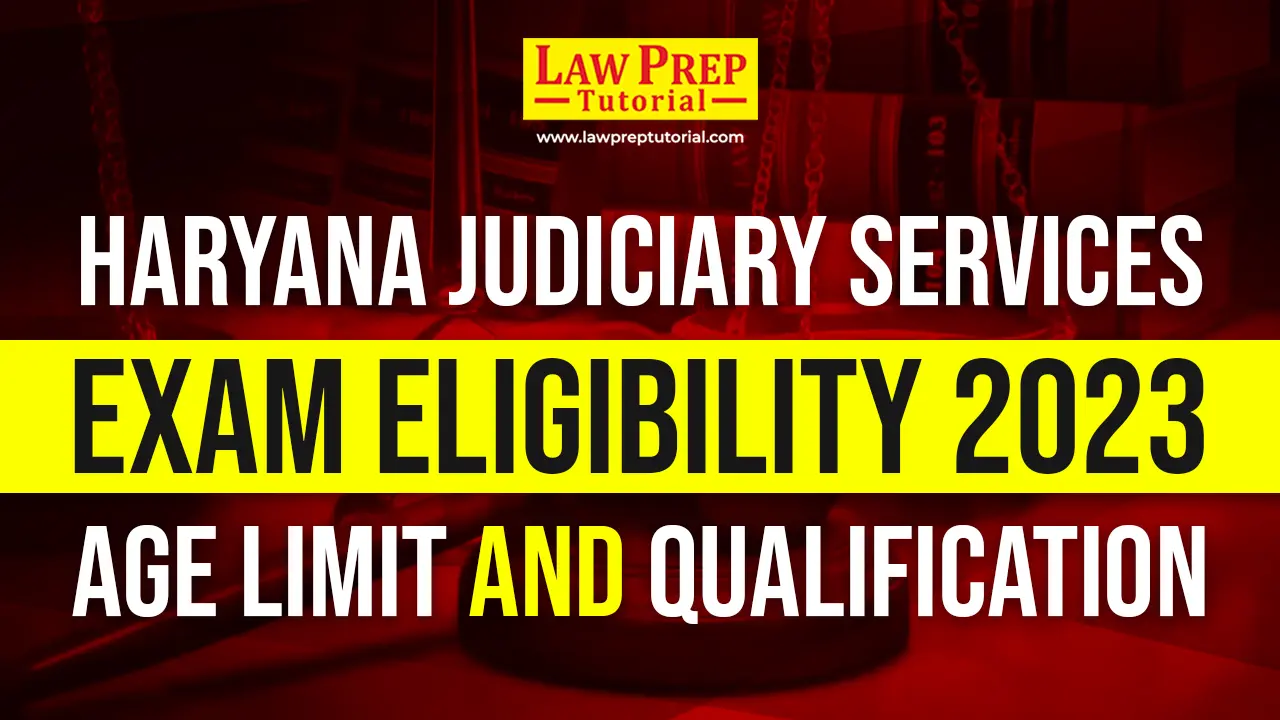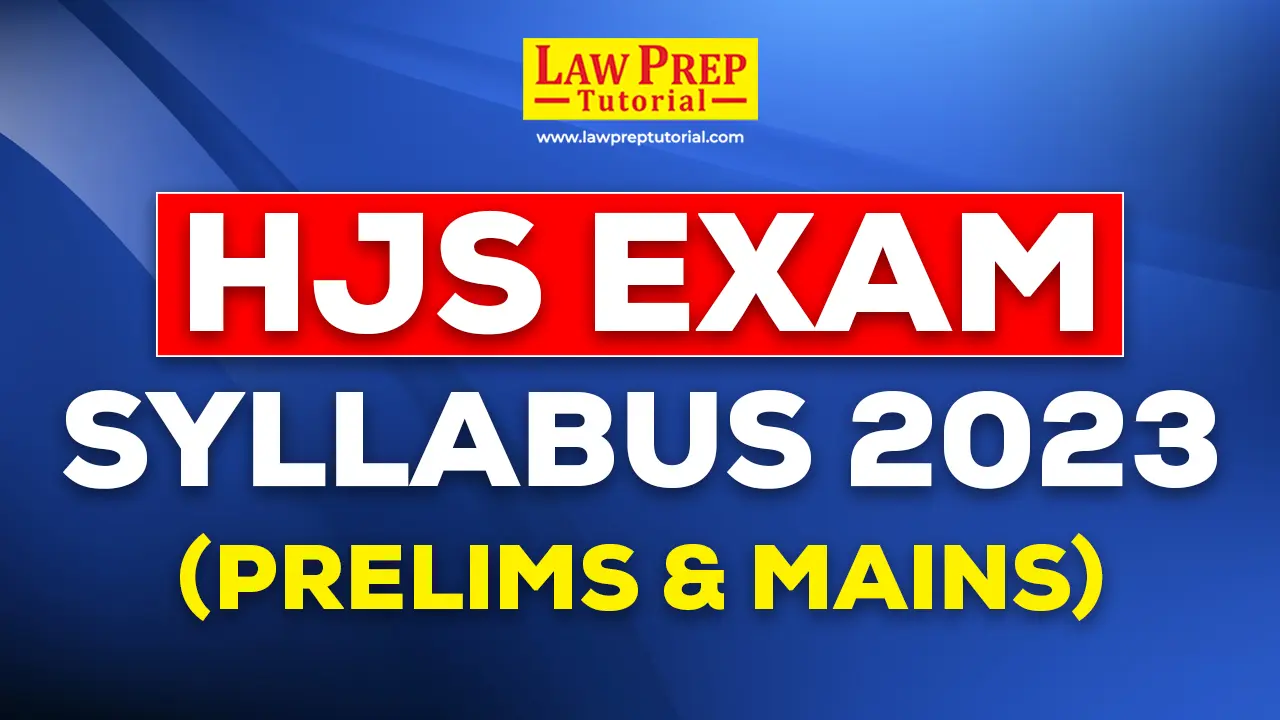Understanding the Haryana Judiciary exam pattern is crucial for any aspirant aiming to succeed in the HPSC judicial services examination. Hence, we are providing you a detailed overview of the Haryana judiciary exam pattern, helping you to strategically prepare and plan the study schedule.
We will break down each component of the exam, including preliminary, mains, and the interview stages, to give you a clear picture of what to expect.
Haryana Judiciary Exam 2025: Overview
The Haryana Judiciary Exam, conducted by the Haryana Public Service Commission (HPSC), is a competitive examination aimed at recruiting qualified candidates for the positions of Civil Judge (Junior Division) in the state’s judicial services.
The examination process is comprehensive, designed to assess not only the legal knowledge but also the analytical capabilities and personality traits of the aspirants.
1. Preliminary Examination
The preliminary stage is the first hurdle in the selection process. It consists of a single paper that serves as a screening test. This objective-type paper typically includes questions covering various aspects of law, such as the Indian Penal Code, Civil Procedure Code, Criminal Procedure Code, and Contract Law, among others.
The preliminary exam is designed to test the candidate’s general legal knowledge and aptitude. It is important to note that the marks obtained in the preliminary examination are not counted towards the final selection; its primary purpose is to qualify candidates for the mains examination.
2. Mains Examination
Candidates who clear the preliminary exam proceed to the mains examination, which is the key determinative stage of the selection process.
This stage tests the candidate’s in-depth knowledge of the law, their ability to articulate and present arguments coherently in writing, and their overall comprehension of legal principles.
3. Interview/Viva-Voce
The final stage is the interview or viva-voce, where candidates who have successfully passed the mains examination are assessed by a panel. The interview is designed to evaluate the candidate’s suitability for a career in the judiciary.
It tests their personality, judgment, current affairs knowledge, and overall ability to handle the responsibilities of a judge. The panel may ask practical questions based on hypothetical scenarios to judge the candidate’s legal acumen and decision-making skills.
Final Selection
The final selection of candidates is based on the cumulative scores of the mains examination and the interview. The preliminary exam scores are used solely for qualifying purposes.
Boost Your Preparation With Haryana Judiciary Test Series Now!
Haryana Judiciary Exam Pattern (Prelims)
The preliminary examination is the first step towards realizing your dream of becoming a judicial officer in Haryana. Here’s what you need to know:
Total Marks
The preliminary examination holds a total weightage of 500 marks.
Question Type
Objective-type questions with multiple-choice options.
Total Questions
There are 125 questions in the preliminary exam.
Marks per Question
Each correct answer is awarded 4 marks.
Negative Marking
For every wrong answer, 0.8 marks (1/5th of the question’s weight) will be deducted.
Duration
The preliminary exam is conducted for 2 hours.
Passing Criteria
Candidates need to score a minimum of 150 marks to qualify for the Mains exam.
Subjects Covered
It typically covers subjects such as General Knowledge, English, and Law.
Key Points:
- The Preliminary Examination questions will be drawn from the syllabus prescribed for the Main Examination.
- Candidates are expected to possess a general understanding of the Mains exam subjects.
- Along with this, they have the capability to respond to queries related to current national and international events, Indian legal and constitutional history, and governance.
- Additionally, candidates will undergo an evaluation of their analytical skills, reasoning abilities, and aptitude.
- The questions will be structured to align with the expected knowledge and proficiency level of individuals who have completed their legal education. This is to ensure a comprehensive assessment of candidates’ knowledge and abilities.
The preliminary examination serves as a crucial gateway to the main examination. So thorough preparation is essential to ace this stage.
Haryana Judiciary Exam Pattern (Mains)
Upon successfully clearing the preliminary examination, candidates advance to the main examination. Let’s explore its key aspects:
Total Marks
- The Main Examination is weighted with a total of 900 marks.
Question Type
- Subjective/narrative-type questions for all papers in the Main Written Examination.
Medium of Examination
- The Main Examination is conducted in English, except for the language paper, which is in Hindi (in Devnagri Script).
Duration
- Each paper in the Main Examination lasts for 3 hours, providing candidates with ample time to complete the exam.
Passing Criteria
- In accordance with the guidelines, no candidate will receive credit for any written paper unless they secure a minimum of 33% marks in it.
- This criterion emphasizes the importance of attaining a certain level of proficiency in each paper to qualify for consideration in the evaluation process.
Comprehensive Coverage
- The Mains exam covers a wide range of legal topics, including substantive law and procedural law.
Detailed Analysis
Candidates are expected to demonstrate a deep understanding of legal principles and their application through case studies and hypothetical scenarios.
Language Proficiency
Proficiency in English and Hindi is essential for effective communication and expression in the main examination.
Key Points About HPSC Judiciary Mains Exam Pattern
- As per the latest notification issued by the Haryana government, the main written examination will comprise five papers.
- The language paper adheres to the standard of the Matriculation Examination conducted by the Board of School Education, Haryana. This ensures uniformity in the evaluation process and facilitates a fair assessment of candidates’ language proficiency. Candidates are encouraged to familiarize themselves with the prescribed standards to prepare for this particular component of the examination effectively.
- Candidates should take note of this structure and strive to perform satisfactorily in each paper. Doing this will enhance their overall chances of success in the examination.
The main examination is a rigorous test of candidates’ legal knowledge, analytical skills, and writing abilities.
Haryana Judiciary Exam Pattern (Viva Voce)
The viva voce, or the interview stage, is the final hurdle in the Haryana Judiciary recruitment process. It aims to assess candidates’ personalities, communication skills, and overall suitability for judicial roles. Here’s what you need to know about the viva voce:
Personal Interview
The viva voce typically involves a face-to-face interview with a panel of experts.
Evaluation Criteria
- During the interview, candidates are evaluated based on their knowledge, articulation, confidence, and demeanor.
- The interview assesses candidates’ personalities, interpersonal skills, legal knowledge, and awareness of current affairs.
Total Marks
The Viva Voce or Personal Interview stage is worth a total of 200 marks.
Qualifying Marks
- Candidates must score a minimum of 50% in the aggregate of the Mains and Interview to be considered for the final merit list.
- For candidates belonging to specific categories like SC/ST/PwD/Backward Class/Ex-Servicemen, the qualifying marks may vary (e.g., 45%).
Final Selection
- The viva voce marks, combined with the main examination scores, determine the final selection of candidates for judicial positions.
Key Points:
- Personal interviews, or viva voces, assess candidates based on their characteristics.
- Only English will be used during the interview.
- The number of candidates called for the vice voca test will not exceed three times the number of advertised vacancies.
Preparing effectively for the viva voce is essential to leave a lasting impression on the selection panel.
Haryana Judiciary Marking Scheme 2025
Understanding the Haryana Judicary marking scheme is crucial for optimizing your performance in the exam. Here’s how the marking scheme works:
Prelims
| Question | Marks |
| Correctly Answered Question | +4 marks |
| Wrongly Answered Question | -0.80 marks |
| Unanswered / Unattempted Question | No marks |
The total score obtained in the preliminary examination determines whether a candidate qualifies for the main examination. It’s imperative to approach the preliminary examination strategically to maximize your score while minimizing the risk of negative marking.
Mains
| Paper | Subjects | Marks |
| I | Civil Law-1 | 200 |
| II | Civil Law-2 | 200 |
| III | Criminal Law | 200 |
| IV | English | 200 |
| English Essay (1000-1100 words) | 100 | |
| Precis | 25 | |
| Words & Phrases (Make sentences of the given words and Phrases) | 25 | |
| Comprehension | 25 | |
| Corrections | 25 | |
| V | Language | 100 |
| Idioms and corrections, Composition (essay) | 50 | |
| Translation of an English passage into Hindi | 20 | |
| Explanation of a Hindi passage in both prose and poetry using the same language | 30 | |
| Total | 900 |
Mastering the art of answer writing is crucial for securing a competitive edge in the main examination.
Wrapping Up:
Successfully cracking the Haryana Judiciary Exam requires a deep understanding of legal concepts and a well-rounded preparation strategy.
To enhance your chances of success, join the online judiciary coaching by Law Prep Judiciary. Our expert instructors provide personalized guidance, extensive resources, and judiciary mock tests that replicate the HPSC exam pattern, ensuring you are fully prepared for every aspect of the exam.
Important Resources for You:




